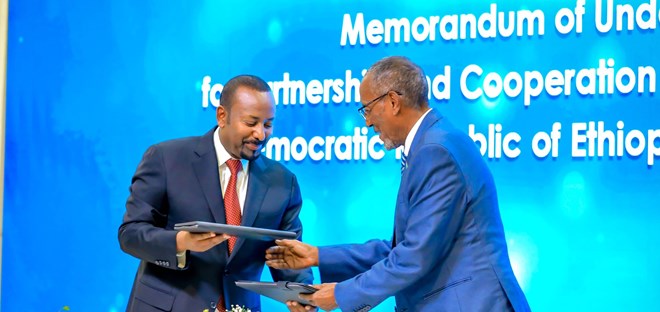By Adam Aw Hirsi
Thursday January 25, 2024

Introduction:
The world of international relations is an intricate web of political maneuverings, perceptions, fault lines, power-jockeying, generally accepted deceptions, delicate balances, and strategic socioeconomic, security, and political considerations and ramifications. However, amidst this complex landscape, the concept of political, diplomatic, or military adventurism often emerges as misguided and futile approaches towards achieving national objectives. From near and far experiences, adventurism achieves the opposite of the objective it was ostensibly undertaken, precipitating a self-inflicted diminution of the adventurous nation's prowess.
This brief seeks to delve into the heart of adventurism by dissecting its deleterious effects, utilizing Ethiopia’s "The Sea-Gate" MoU with "Somaliland" as a case study to elucidate this multifaceted issue in general, while shedding light on the expected net outcome for Ethiopia from this particular foray.
1. Strategic Deterioration:
Adventurism, manifested through a reckless approach and interventions, carries the inherent risk of overextending a nation's resources and capabilities, not to mention the inherent strategic deterioration that may ensue. Ethiopian government is already fighting rebels in the Oromia, Tigray, and Amhara regions of Ethiopia. It is a member of troop-contributing countries to ATMIS, a UNSC-sanctioned African Union peacekeeping mission in Somalia. Additionally, it is deeply embroiled in the power tussle between President Al Burhan and RSF's Hemedti Dagalo in Sudan.
Overextensions in financial, diplomatic, and security sectors lead to strategic deterioration, exposing vulnerabilities and eroding a nation's international standing. Through sheer miscalculation and unbridled adventurism, Ethiopia has on January 1st 2024 ventured into dangerous territory by inking an agreement with a regional administrator from Somalia.
In this hastily arranged and highly publicized event, Ethiopia has done irreparable damage to its diplomatic clout, diminished its international standing, and perhaps fatally squandered its long-term regional objectives and interests.
2. Unforeseen Consequences and Blowbacks:
The unintended consequences of adventurism in international relations are particularly palpable in Ethiopia. As evidenced by Somalia's reaction to the Ethiopian infringement, it doesn't take a rocket scientist to understand that such a move would trigger a chain of events known as "blowback" in realpolitik circles. In a classic blowback scenario, the initial goals of the adventurist—access to the sea for Ethiopia's millions of citizens in this case—are overshadowed by unforeseen negative outcomes. This phenomenon is based on a causal relationship between provocative actions from Ethiopia and retaliatory responses from Somalia, where "everything is on the table in defense of the homeland” has become the standard response.
3. Resource Misallocation and Opportunity Cost:
Adopting an adventurous foreign policy can divert crucial resources away from domestic priorities. This misallocation of resources not only burdens national economies but also deprives governments of the opportunity to continue investing in social capital, education, healthcare, and infrastructure. By neglecting these fundamental aspects, adventurous states undermine their long-term prosperity and the societal stability of their own citizens. The Ethiopian government has used excessive time, resources, and political capital in their in-vain attempts to spin away the spirit of "The Sea Gate" MOU in a way that is palatable to a shocked civilized world. These resources could have been used by the Ethiopian government to reconcile with armed groups in Oromia and Amhara, as well as to improve the situation for the starving and beleaguered civilians in Tigray.
Therefore, it would not be unfair to suggest that the current arrangement has traded the lives, well-being, and dignity of millions of Ethiopians in the regions alluded to above in exchange for the favor of an out-of-depth and out-of-mandate regional official from Somalia, Muse Bihi Abdi.
4. Diminished International Standing:
Generally, adventurism has detrimental effects on a nation's international reputation and leads to a erosion of international standing. By projecting a perception of aggression and recklessness, adventurous states risk alienating potential allies and eroding trust within the international community. This was evident when the Ethiopian Prime Minister, a Nobel Laurate, skipped the 42nd IGAD Extraordinary Summit in Kampala on the issue only to attend the 19th NAM Summit in Kampala at the same time. “The Sea Gate” MOU not only poses significant obstacles for future collaborations between Ethiopia and its neighbors, particularly Somalia, but also has the potential to isolate and diminish the sphere of influence of Ethiopia, the vital East African country that proudly hosts the African Union continental body.
Difficult to Disentangle:
The inherent bravado that often accompanies adventurism undermines diplomatic efforts and hampers the effectiveness of future negotiations. By prioritizing confrontational approaches, threats, and condescending language over reason and a rules-based approach, adventurous nations, in the case of Ethiopia, burn permanent bridges in their pursuit of temporary thrills.
Conclusion:
In the realm of international relations, the illusory temptation of adventurism often obscures pragmatic realities and long-term consequences. It is therefore advisable for Ethiopia to regain its senses sooner rather than later and resist succumbing to the fantasy of adventurism. A stitch in time saves nine.
Caveat: The aim of this article is not to criticize Ethiopia. My position on Ethiopia's "The Sea-Gate" MoU with Somalia's "Somaliland" region is already abundantly clear through my recent numerous engagements in international news and statements on my social media handles. Rather, it is purely instinctive and based on personal belief that if Ethiopia does not retreat from its current unacceptable approach towards Somalia's territorial integrity, both parties will engage in a destructive conflict and suffer significant losses. History will remember the belligerent party with particular infamy.
Adam Aw Hirsi (PhD) is a Minister of State in the Somalia Cabinet. He can be followed on @X — @JustAwHirsi.